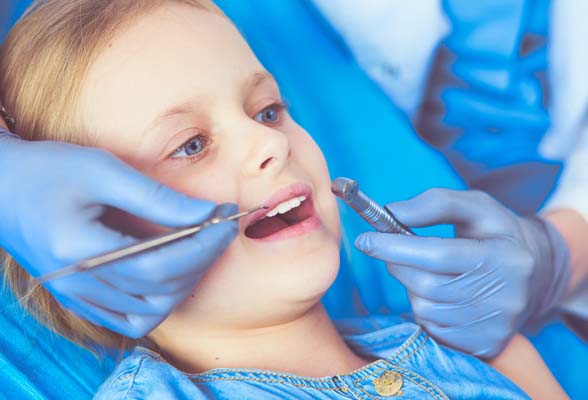What to Ask Your Pediatric Dentist About Cavity Treatment for Kids

Cavity treatment for kids is a chief concern among parents, and for a good reason. Cavities are common in children of all ages. According to the Centers for Disease Control and Prevention, over half of the kids ages 6 to 8 have had at least one cavity in a primary tooth. The good news is that a pediatric dentist offers many options for cavity treatment for kids and can help your child prevent future cavities.
The Importance of primary teeth
While primary teeth eventually fall out and are replaced by permanent teeth, they are still important. Cavities left unchecked in primary teeth can lead to infection and dental pain. In addition, if primary teeth fall out too early, this affects the way permanent teeth erupt. Primary teeth are a key part of a child's future dental health. Therefore treating cavities as soon as possible is vital.
Cavity treatment for kids from a pediatric dentist
The type of treatment a pediatric dentist recommends depends on how far the cavity has progressed. This is why children's regular dental appointments are crucial. A dentist can often catch a child's cavity before it has progressed too far. In addition, a dentist can provide regular fluoride treatments during these appointments that help prevent cavities or slow their progression.
Filling
The most common treatment for a cavity in a child is a filling. The sooner a parent seeks this treatment for their child, the less drilling is involved to remove the decayed portion of the tooth. Typically, various filling options are available, from silver or amalgam to tooth-colored fillings. The child's pediatric dentist can help select the right filling material.
Dental crown
Sometimes, despite the best efforts, a cavity progresses to something more serious. If a large portion tooth needs removal, saving it is still a good idea to prevent future dental issues. For these situations, dentists use a crown over the damaged tooth to protect and keep it strong.
Root canal therapy
In severe cases, dental decay can reach the pulp and infect the tooth. This situation is where the child's dentist will need to perform a root canal. This procedure is where the dentist removes the tooth pulp and infection before using a tooth filling.
Prevention
Cavities are common in children for several reasons. A major one is that children's molars often have deep grooves that trap plaque and bacteria. Many times a toothbrush is not enough to clean these deep groves. Therefore, dentists that work with kids offer dental sealants. This clear material fills the groves, keeping plaque and bacteria out.
Education is another important cavity prevention tool at a dentist's disposal. A pediatric dentist excels at making dental health fun and interesting for kids. In addition, these professionals are trained to teach children healthy habits such as avoiding sugary foods and drinks and brushing and flossing regularly.
Get a jump on cavity treatment and prevention
If you suspect your child has a cavity or if it has been a while since they have seen a dentist, we can help. Our caring staff will keep your child comfortable during whatever treatment they require. Call our office today to make an appointment or learn more about cavity treatment for kids.
Request an appointment here: https://bergencountypediatricdentistry.com or call Bergen County Pediatric Dentistry at (201) 312-6937 for an appointment in our Allendale office.
Check out what others are saying about our dental services on Yelp: Pediatric Dentist in Allendale, NJ.
Related Posts
When your child has a dental emergency, a visit to a pediatric dentistry office is likely necessary. Most pediatric offices are well equipped to handle serious dental injuries. In fact, taking your child to see their regular dentist can be very beneficial. Your child can feel more at ease than they would in a new…
Though rewarding, parenting is often difficult. One of the most difficult aspects of parenting that you will encounter early in your child’s life is teething. Fortunately, a pediatric dentistry professional can help you understand what to expect and, more importantly, give you advice on how to ease your child’s pain during this challenging time in…
Pediatric dentistry focuses on diagnosing, preventing, and treating oral health concerns in children who still have their baby teeth. This review closely examines what parents and the pediatric dentistry team can do to protect baby teeth from cavities, dental trauma, and other forms of damage.Caring for baby teeth should involve brushing and flossing regularly, limiting…
Cavities are a fact of life for people of all ages. Even with routine pediatric-dentistry care, most people will develop at least one cavity by the age of 20, according to the Centers for Disease Control and Prevention. Children can be especially prone to cavities for reasons including:Diets high in sugarInability to independently clean teeth…
